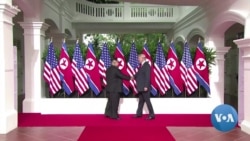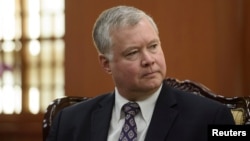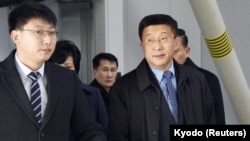With the second summit between U.S. President Donald Trump and North Korean leader Kim Jong Un one week away, final preparations are underway in Vietnam for the Feb. 27-28 talks in Hanoi. It remains unclear what the outcome between the two leaders will yield. But former North Korean Deputy Ambassador to Britain Thae Yong Ho tells reporters that Pyongyang’s long-term goal was to remove the U.S. and United Nations presence from the Korean Peninsula.
During Kim Jong Un’s New Year’s speech, he said Pyongyang called for a “staged approach” for the creation of a “peace regime” on the Korean Peninsula.
Thae explained that Kim suggested a buffer zone that would reduce the possibility of military conflict between the two Koreas and for it to be gradually expanded from the border between the two Koreas throughout the whole peninsula as one way of achieving peace.
Thae said if Trump issues an end of war declaration at the Hanoi summit, which many analysts say is possible, then North Korea could assert there is no reason for the U.N. Command to remain on the peninsula, because the “reason for the U.N. Command is to prevent any possible military confrontations between the two Koreas.”
Speaking at the Chey Institute for Advanced Studies in Seoul last week, Bruce Bennett, senior defense researcher at the Rand Corp., also identified possible long-term objectives for Kim Jong Un.
“I think he wants to see U.S. disengagement from the peninsula, I think he wants to be in a position where he can put significant pressure on South Korea, and I think he needs to solidify his internal support,” Bennett said.
Regardless of the analysis by intelligence agencies and experts, Bennett said Kim’s objectives are not governed by what we think is possible for North Korea to achieve.
“What matters for him (Kim Jong Un), that’s what he thinks he can accomplish, because that’s going to drive those actions,” Bennett said.
Denuclearization
Speaking to reporters in the Oval Office Tuesday, President Trump expects “a lot of things will come out” of the second summit with Kim Jong Un.
He called the upcoming meeting “very exciting,” but said Washington’s ultimate goal is North Korea’s denuclearization.
“I think we will see that ultimately. I have no pressing time schedule,” the president said, adding, “As long as there’s no testing, I’m in no rush. If there’s testing, that’s another deal.”
Watch related video report:
Trump said he’d “love to” be able to take the sanctions off the North, but would do so only if it does “something that’s meaningful” toward denuclearization.
Trump claimed during his State of the Union address that “If I had not been elected president of the United States, we would right now, in my opinion, be in a major war with North Korea with potentially millions of people killed.”
However, Tuesday he said the relationship was “far less dangerous and there’s a lot of sanity, a lot of really sane thinking.”
But Thae said there never really was a threat of war to the United States posed by North Korea.
Instead, the former diplomat suggested that North Korea’s rhetoric was aimed at Washington’s role of establishing a deterrent for conflict in the region and that President Trump “fell into his trap.”
“The fact that President Trump spoke at the General Assembly of the United Nations and proclaimed that there is a real possibility of a war, [was] a major strategic mistake,” Thae said.
He went on to say the belief that the United States and North Korea were on a nuclear “collision course” was a result of North Korean manipulation.
Thae said Kim Jong Un had successfully shifted the focus on North Korea to the strengthening of relations and establishing peace for nuclear disarmament.
“North Korea was able to establish this framework with the United States that it is more urgent to establish the confidence-building relationship between these two countries and then we can start nuclear dismantlement,” he said.
Bennett was unsure Kim would agree to fully abandon his nuclear weapons program, even if an end of war declaration is made.
If President Trump makes the declaration, Bennett said, “It’s got to end the broader war and lead to a real condition of peace as opposed to the appearance of peace.”
Hanoi preparations
The State Department announced Tuesday that U.S. Special Representative for North Korea Stephen Biegun was en route to Hanoi in preparation for the summit.
“A lot of things are being discussed, and we are very much looking forward to next week,” said deputy spokesperson Robert Palladino.
Kim Hyok-chol, Biegun’s North Korean counterpart, was also spotted in Beijing Tuesday, and it is assumed he would be traveling to Vietnam as well.
In a phone call with President Trump on Tuesday, South Korean President Moon Jae-in spoke about the upcoming second U.S.-North Korea summit.
A statement from South Korea’s presidential office said Moon offered his country’s assistance to President Trump as a “concession” to Pyongyang in order to expedite North Korea’s denuclearization.
That could include anything from reconnecting rail and road links between the two Koreas to other inter-Korean economic cooperation.
Moon said South Korea was “determined to take up that role if President Trump asks, if that’s the way to lessen the U.S. burden,” according to Moon’s spokesman Kim Eui-kyeom.









